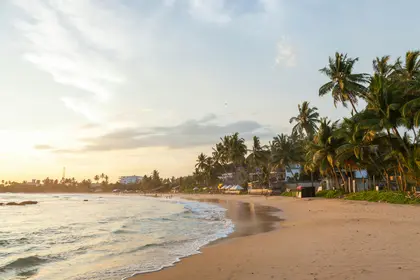Three weeks ago, Sri Lanka abruptly pulled the plug on gratis visa extensions that Russian visitors had been exploiting to overstay their welcome in the small island nation ever since the full-scale invasion of Ukraine began.
Interestingly, this move coincided with a distasteful “whites only” party that was set to take place at an upscale Russian-run restaurant called Sarayka Lounge in the southern resort town of Unawatuna. Despite ultimately cancelling the event amid fierce public backlash, its organizers only made matters worse by attempting to absolve themselves of any willful bigotry or prejudice vis-à-vis native inhabitants.
JOIN US ON TELEGRAM
Follow our coverage of the war on the @Kyivpost_official.
The damage control from their faux pas was reminiscent of the Kremlin’s PR campaign to downplay deep-seated xenophobia within Russia prior to the 2018 FIFA World Cup. The Russian Embassy in Colombo supplemented Sarayka’s tepid Instagram apology with a press release denouncing “all forms of racial discrimination and nationalism” while farcically citing the special military operation as proof of Moscow’s commitment to “combat any manifestations of these atrocities.” Its chief envoy, Levan Jagaryan, also reminded his debt-laden hosts that Russian vacationers are “of great importance” as they constitute the lion’s share of international arrivals.
Unwelcome guests
The clannish nature of overseas-based Russians is nothing new, nor is their disposition to behave like settlers rather than guests wherever they go. Besides their poor conduct, a burgeoning pool of Russian exiles have been undertaking clandestine work and operating unlicensed businesses in Sri Lanka that cater exclusively to their own community.

US Must Address Russian Disinformation to Strengthen US Election Integrity
An almost identical phenomenon is prevalent throughout the ASEAN region, where an uncontrolled influx of first-time travelers from Russia’s Far East has given rise to parallel societies that function in a vacuum and independently of the law of the land.
Police raids on “Little Moscow” criminal enclaves in the likes of Phuket and Bali have spiked over the past few years and prompted federal authorities to consider reinstating a visa regime for Russians as well as Ukrainians. Admittedly, Russian President Vladimir Putin bears sole responsibility for hollowing out a sizeable chunk of the economically active population and consigning them to a nomadic, directionless life that is fast burning a hole in their pockets. It is worth noting that Sri Lanka’s revised immigration rules do not, by any means, prohibit Russians from settling down there, but simply cash in on their post-war desperation to establish a sense of belonging elsewhere.
Enough is enough
Foisting additional bureaucracy and expenses on these entitled second home seekers could offer the other “friendly” jurisdictions they have hijacked food for thought. In early 2023, Kazakhstan closed a similar loophole by capping the length of stay for predominantly Middle Volga “relokantys” at 90 days within a six-month period as opposed to ad infinitum. Meanwhile, Azerbaijan recently extended the COVID-19-induced closure of its land borders until July to pre-empt the erosion of nationhood and mushrooming of fifth columns that its South Caucasian neighbors Armenia and Georgia succumbed to.
Even the Emiratis, who afforded Putin a hero’s welcome in Abu Dhabi last December and have long served as the de facto Swiss bankers for his plutocrat cronies, started closing the onshore bank accounts of corporate and individual Russian clients shortly thereafter to avoid US-led secondary sanctions.
Playing ball with Western powers on the Russo-Ukraine front had arguably contributed to the UAE’s removal from anti-money laundering watchdog FATF’s grey list in February. Household Turkish and Chinese lenders have followed suit by ceasing all transactions with Russia and severing correspondent banking relationships.
Being hamstrung from accessing basic financial services is a major body blow for Russian émigrés, not least since this quandary essentially reduces them to non-persons and jeopardizes their very future in places such as Dubai and Istanbul where many draft dodgers are now domiciled. De-banked oligarchs fronting for Putin, in particular, will have a harder time lobbying non-aligned states to stay the course as it becomes more cumbersome for them to establish shell companies, snap up luxury properties and make other big-ticket purchases abroad.
Another reason why emerging markets in dire need of all the foreign direct investment (FDI) they can muster seem prepared to send undesirable Russians packing is because they are not actively seeking reciprocity from Moscow in terms of facilitated bilateral travel arrangements. Over and above giving them a taste of their own medicine, Ukraine’s retaliatory drone and missile strikes on critical infrastructure targets have rendered Russia a radioactive destination to frequent, while upending its grand plans to bolster non-oil revenue by drawing tourists from the so-called “global majority”.
The journey itself is fraught with safety hazards as embargoed Russian carriers struggle to procure spare parts and forgo necessary maintenance. Furthermore, there is mounting evidence that Russia’s relaxation of entry requirements is a mere bait-and-switch gimmick to hoodwink third-world nationals into becoming soldiers of fortune against their will. The fact that tens of thousands of Indians and Nepalis who headed there for leisure purposes have unwittingly ended up serving in the Russian army is a case in point of the Kremlin’s sinister intentions behind opening up at breakneck speed.
When it comes to international relations, Russia does not have any bona fide allies or friends but instead, a legion of fleeing, fair-weather partnerships with fellow autocracies that hinge on a shared disdain for the “hegemonic West”. That said, fence-setters in Asia, Africa and Latin America are slowly but surely wising up to the grim reality that multipolarity à la Russe is not the utopia Putin makes it out to be. If anything, Russian citizens who brazenly throw their weight around and exude an air of superiority in the few remaining countries still willing to harbor them are only thrusting their pariah government into further isolation on the global arena.
The views expressed are the author’s and not necessarily of Kyiv Post.
You can also highlight the text and press Ctrl + Enter






